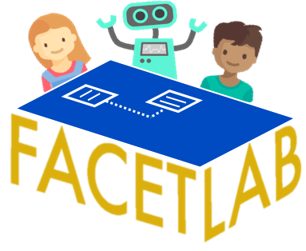
Dr. Erin Walker
Principal Investigator
Erin is a Associate Professor at the University of Pittsburgh, with joint appointments in Computer Science and the Learning Research and Development Center. She uses interdisciplinary methods to improve the design and implementation of educational technology, and then to understand when and why it is effective. Her current focus is to examine how artificial intelligence techniques can be applied to support social human- human and human agent learning interactions.

Dr. Cassandra Kelley
Broader Impacts Project Coordinator
Cassandra has over fifteen years of experience in K-12 and teacher education. She earned her doctorate degree in Learning Technologies from Pepperdine University and is passionate about exploring new tools that can improve teaching and learning. She currently supports the FACETlab and the Center for Integrative Research in Computing and Learning Sciences(CIRCLS) nonprofit organization with AI and emerging technologies research projects led by academic researchers, K-12 educators, industry researchers, and other interested groups. Cassandra also teaches graduate courses for National University in the Master of Science in Designing Instructional and Educational Technology (MSDIET) Program.

Dr. Bih Janet Shufor
Postdoctoral Researcher
Janet is an Engineering and Learning Science Postdoctoral researcher at the University of Pittsburgh. She earned her PhD in the Learning Sciences at the University of Maryland. Her work lies at the intersection of the Learning Sciences, human-computer interaction, and computer science education with an emphasis on the application of theory to the design and evaluation of innovative computational learning environments. Her research contributes to understanding how best to engage people in reasoning about computational ideas and how to design activities to support these practices. To be more specific, her research focuses on using interdisciplinary approaches to define human experiences in computing and robotics environments. To be more specific, she examines human interactions with technology, in areas such as artificial intelligence, computational thinking, and robotics. Janet is driven to investigate methods that can guide the design of intelligent tools that can enhance both social and human-centered computing, as well as human-machine interactions.

Deniz Sonmez Unal
PhD Student
Deniz is a doctoral student in intelligent systems at the University of Pittsburgh. Her work explores modeling student cognitive states during usage of different educational technologies. Her current projects include understanding the low-level cognitive mechanisms of cognitive control and rule learning to identify key moments during learning as well as distinguishing between productive and unproductive states students experience. She has presented her work at professional conferences such as Educational Data Mining (EDM) and Artificial Intelligence in Education (AIED).

Jordan Barria-Pineda
PhD Student
Jordan is a doctoral student at the University of Pittsburgh. His research interests are related to Information Visualization, Adaptive Information Systems and Human-Computer Interaction fields. He likes exploring how to combine these knowledge areas with the aim of building systems that are able to influence users to make positives changes in their online behavior, specifically in online learning environments.

Yuya Asano
PhD Student
Yuya's is a doctoral student at the University of Pittsburgh. His research interest lies in the intersection of natural language processing (NLP), human-computer interaction (HCI), and educational technology. He works on the application of NLP in the domain of education to make distance learning more interactive and offer rich education to everyone regardless of their socioeconomic status.

Zak Risha
PhD Student
Zak is a doctoral student in Information Science at the University of Pittsburgh. An interdisciplinary scholar, Zak's research lies at the intersection of education, technology, and the humanities, exploring how to create educational tools and systems with complex, multifaceted outcomes that go beyond knowledge acquisition. More specifically, he is interested in how to engage youth with data intellectually, collaboratively, and personally, as well as how to design technologies for unstructured, intricate skillsets like reading and interpreting poetry.

Jennifer Nwogu
PhD Student
JJennifer is a doctoral student at the University of Pittsburgh studying information science. Her research focuses on identifying goals and understanding the design preferences of users when interacting with information technologies. Her focus aims to create reflection tools that support information literacy and user design preferences on digital devices through collaboration with end users.

Paras Sharma
PhD Student
Paras is a new Computer Science PhD student at the University of Pittsburgh. His research interests lie in the intersection of Human-Computer Interaction and Natural Language Processing (particularly Natural Language Dialogue Systems). He wants to research ways to apply HCI and NLP to enhance group interactions and make educational technologies more interactive.









